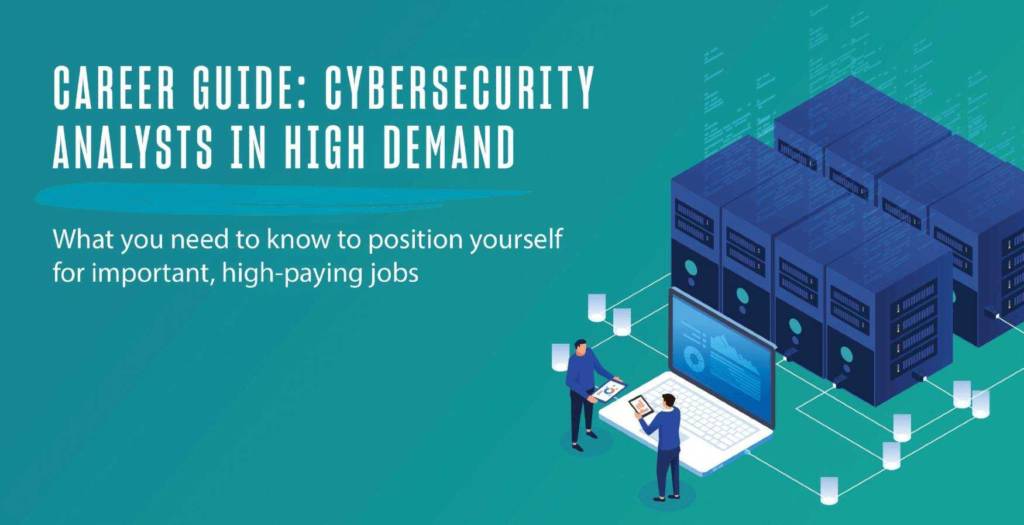Would you like to explore an exciting cybersecurity role that is in high demand and offers the potential for lucrative compensation, consistently ranking among the best opportunities in the field? If so, consider the information security analyst position, which is ranked near the top of U.S. News & World Report’s lists of Best Technology Jobs, 100 Best Jobs and Best STEM Jobs.
What Is an Information Security Analyst?
An information security analyst is a skilled professional who works to protect a business or organization’s systems, networks and databases from breaches and cyber attacks.
What Does an Information Security Analyst Do?
Responsibilities will vary depending on the specific role and business you work for, but here are the typical responsibilities of an information security analyst:
- Keep a close eye on their company or organization’s networks and systems for any type of breach or cyber attack and thoroughly investigate should one occur.
- Implement software such as data encryption programs and firewalls to help protect information.
- Examine computer and network systems for vulnerabilities.
- Keep up to date on the latest information technology security news and trends.
- Create reports that outline important security-related data and metrics, such as the number of attempted breaches or attacks.
- Create security protocols and optimal practices tailored to their organization.
- Suggest security improvements to management or senior IT personnel.
In this type of position, you may also be expected to be on call at certain times of the day or weekend.
Skills, Education and Experience Needed
Skills
If you’re considering this type of role, there are certain hard and soft skills that will help you succeed. Knowledge of computers, databases, programming languages and networks is a must, in addition to basic IT and cybersecurity know-how. (Senior-level positions may require more cybersecurity knowledge and experience.)
Good analytical, communication, organization and problem-solving skills are also helpful, in addition to skills related to incident response and network security.
Education
Most positions require at least a bachelor’s degree, often in computer science, information technology or a related field in engineering or math. Some entry-level roles may only require a high school diploma and relevant industry experience.
Certifications may also be beneficial; popular ones include Security+, Certified Information Systems Security Professional (CISSP), Information Systems Audit and Control Association and the Global Information Assurance certification.
Some employers may prefer to hire candidates with a master’s degree, depending on the role and how much experience is required.
Experience
The amount of experience that’s required will depend on the position, but in general, some experience will typically be needed. According to the U.S. Bureau of Labor Statistics, many information security analysts have previously worked as network or systems administrators.
Career Path and Job Titles
If you’re interested in becoming an information security analyst, consider entry-level IT roles and/or internships. Working as a network administrator or systems administrator can also help provide you with much-needed knowledge and experience.
When it comes to job titles, a search for “information security analyst” on LinkedIn reveals more than one thousand openings with related job titles such as: senior information security analyst, lead application security analyst, senior cybersecurity analyst, cyber threat analyst and more.
Alternate or related job titles include cybersecurity specialist, cybersecurity analyst and information security engineer.
Salary and Job Outlook
Your compensation will depend on where you work and your exact responsibilities, but generally, the average information security analyst salary is around $120,000. Those on the higher end of the range, however, can make upwards of $140,000.
The career outlook for this position is extremely promising. Information security analyst roles are expected to grow at a rate of 32% between 2022 and 2023, which is much faster than the national average of 3% for other occupations. As a result, approximately 16,800 job openings are projected each year, on average, over the decade.
How to Become an Information Security Analyst
Ready to get started? Here are the steps you can take to secure an information security analyst position:
- Obtain a relevant bachelor’s degree. Undergraduate options include computer science, information technology, computer engineering or a related field. Even though some positions may require experience in lieu of a degree, education may help set you apart from other candidates and set you up to secure a master’s degree down the line.
- Consider an internship. Benefits of an internship include gaining experience, potentially finding a mentor, creating a professional network and more.
- Seek out an entry-level position. This role could be IT-related or within network or systems administration. This will help you gain valuable industry and technical experience.
- Connect with others in the industry. Harness the power of LinkedIn and reach out to others in the field. Join relevant security associations and conduct informational interviews to learn more about what others have done in the field.
- Embrace continuous learning opportunities. Whether it’s securing a master’s degree and/or obtaining relevant certifications, these types of educational opportunities can provide you with additional knowledge and experience that can help you achieve your career goals.
Top Companies That Are Hiring
There’s no shortage of companies that are looking to hire skilled information security analysts. From technology firms, banks and finance corporations to government entities, entertainment companies and healthcare institutions, there are opportunities across a wide variety of industries and sectors.
Here is a sample:
- San Francisco Department of Technology
- U.S. Bank
- Air National Guard Recruiting
- Metropolitan Transportation Authority
- Bank of America
- Warner Bros. Discovery
- CrowdStrike
- Northrop Grumman
- Emory Healthcare
- Boeing
- Microsoft
FAQs
Ready to Take the Next Step?
If you’re serious about becoming an information security analyst, consider the power of an advanced degree.
The University of San Diego offers two options, depending on your career interests and goals — the Master of Science in Cyber Security Operations and Leadership and the Master of Science in Cyber Security Engineering. Both degrees will provide you with the experience, education and skills needed to succeed in the world of cybersecurity. And if you’re still considering which career might be right for you, download this helpful eBook: Top-Paying Cybersecurity Jobs.





